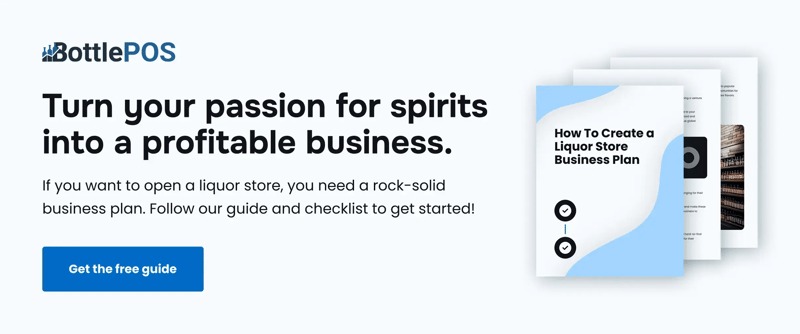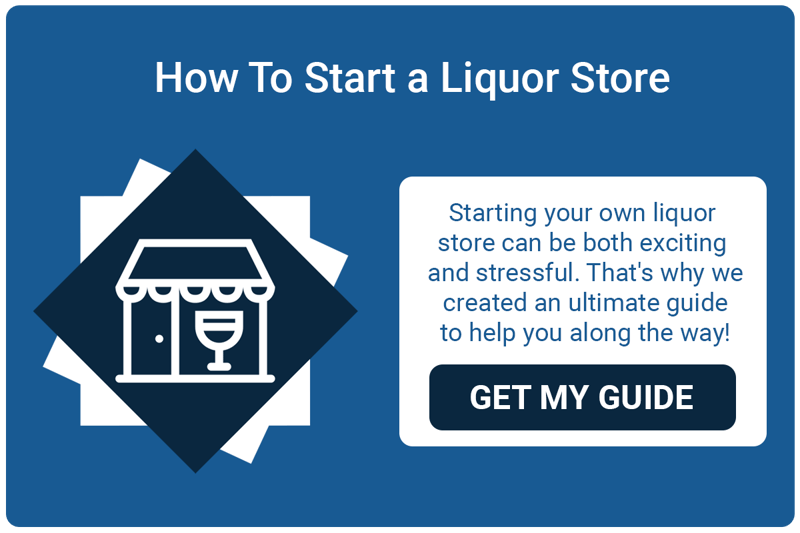Ready to open your own liquor store but need funding to make it happen? You're in the right place.
Opening a liquor store isn’t cheap, and finding the right financing can feel overwhelming. Traditional lenders don't always understand the specific challenges of alcohol retail, and managing the ins and outs of funding without a playbook can feel impossible.
In this blog, we'll walk you through eight proven funding sources that work for independent package stores. From SBA loans to equipment financing for your liquor store point of sale (POS) system, you'll discover which options fit your situation and how to secure the capital you need.
Let’s get started.
Understanding Liquor Store Financing Needs
Before we explore our list of financing options for new liquor store owners, let’s first establish how much of a financial investment you need to prepare for. The overall cost of opening a liquor store tends to fall between $50,000–$200,000. Let’s take a look at the breakdown of startup costs to help you narrow down your range:
- Licensing and permits: $2,000–$15,000: State and local liquor licenses vary by location, with some areas requiring additional permits for wine and beer sales
- Initial inventory: $20,000–$50,000: Your product selection will be one of your largest upfront costs, especially if you plan to stock premium spirits.
- Store location and rent: $1,000–$10,000/month: High-traffic locations command premium rents, but the right spot can make all the difference for walk-in customers.
- POS system and technology: $1,500–$5,000: An industry-specific POS system may seem pricey upfront, but it’s a must for running your business efficiently.
- Renovations: $5,000–$20,000: Depending on your space, you may need a lot of renovations or very few, but you’ll want to set aside some budget for displays, decoration, and more.
- Insurance and security: $2,000–$10,000: Liquor stores are common targets for theft, so you need to invest in insurance and security features upfront.
- Marketing and staff training: $3,000-$18,000: Set aside budget to train new employees and promote your store.
Related Read: 7 Ways To Keep Your Liquor Store Safe and Secure
Don't forget to factor in ongoing operating expenses that keep your doors open and your business booming. Monthly costs like inventory replenishment, payroll and benefits, rent and utilities, insurance premiums, and marketing promotions add up quickly. Be sure to plan for these ongoing expenses.

8 Financing Options for Your Liquor Store
Now, let’s take a look at eight different financing options you can explore for your liquor store.
1. SBA 7(a) Loans
Best for: Established businesses with good credit
SBA 7(a) loans are a popular option for small business owners. This type of loan has low interest rates, long repayment periods, and loan amounts up to $5 million. You can use SBA funds for a variety of expenses, from equipment purchases to real estate costs.
To qualify, your business must have less than $6 million in annual sales and be able to show a financial need. The application process typically takes several months. You also need to provide extensive documentation regarding your business, finances, ownership, and more.
One important restriction: SBA loans cannot be used to purchase liquor licenses, so you'll need alternative funding for licensing costs.
2. Traditional Bank Term Loans
Best for: Borrowers with strong credit and established business history
Traditional bank term loans provide a lump sum that you repay over a predefined period with predictable monthly payments. Banks typically offer competitive interest rates to qualified borrowers. Terms tend to range from one to 10 years, depending on the loan purpose and amount.
When you apply for a traditional bank loan, expect to go through the wringer. You’ll need to provide detailed financial statements, tax returns, business plans, and personal guarantees. Banks also scrutinize credit scores, cash flow, and business history. Interest rates vary based on your creditworthiness and current market conditions, but you can likely get some favorable rates if you're a qualified borrower.
3. Equipment Financing
Best for: Funding POS systems, refrigeration, and security equipment
Equipment financing is a specific type of loan that allows you to purchase necessary business equipment while using the equipment itself as collateral for the loan. This arrangement typically results in lower interest rates since the lender has security in the asset.
What can you use this type of loan for? Most business equipment qualifies, including point of sale systems, commercial refrigeration units, security cameras, and even delivery vehicles. Terms usually range from two to seven years, with rates often lower than unsecured business loans. Some lenders offer 100% financing, meaning no down payment is required.
Already working with Bottle POS? You may also qualify for Bottle POS Capital, a quick, flexible financing option designed specifically for liquor store owners.
4. Business Lines of Credit
Best for: Managing seasonal cash flow and taking unexpected opportunities
Another type of financing you can consider is opening a business line of credit. This financing option functions like a business credit card, giving you access to funds you can draw from as needed.
The advantage of a business line of credit is that you only pay interest on the amount you actually use. This flexibility makes lines of credit a good fit for inventory purchases, especially when you find great deals on popular products or need to stock up for busy seasons. Many liquor stores have seasonal cash flow challenges — a line of credit can help smooth out your slow periods.
Qualification requirements are generally less strict than term loans, though you still need decent credit and business history.
Related Read: Managing Seasonal Inventory for Your Liquor Store
5. Commercial Real Estate Loans
Best for: Purchasing store property
If you’re purchasing a new property for your liquor store operation, a commercial real estate loan is a great liquor store financing option. These loans typically require 20–30% down payments and offer terms up to 25 years, with the property serving as collateral.
Although owning your location rather than renting it is more expensive upfront, it offers stability and gives you equity in the property itself. You can also deduct mortgage interest and depreciation on your taxes. Property ownership also gives you more control over modifications and improvements.
Interest rates are generally higher than residential mortgages, but lower than unsecured business loans. Plus, you may have opportunities to refinance if rates drop or your business grows significantly.
Related Read: Calculating Your Liquor Store Start Up Cost
6. Alternative Online Lenders
Best for: Faster funding with looser requirements
Another option you can explore for liquor store financing is an alternative online lender. This type of lender offers faster approval processes and more flexible qualification criteria than traditional banks. Many can provide funding decisions within days and fund approved loans within a week.
These lenders often accept borrowers with lower credit scores or shorter business histories, making them accessible to newer liquor store owners. Some also offer revenue-based financing, where your payments can change based on your monthly sales.
There is a trade-off, however. Alternative online lenders tend to have higher interest rates and fees and shorter repayment terms, usually ranging from six months to five years. You should only consider alternative lenders when you need funding quickly or if you don't qualify for traditional financing.

7. Merchant Cash Advances
Best for: Emergency funding with poor credit
If you have poor credit and still need funding, you might explore merchant cash advances. This type of financing provides upfront funding in exchange for a percentage of your daily credit card sales until the advance is repaid (typically 10–20% of daily sales).
This option requires no collateral and has minimal qualification requirements, but they can be expensive in the long run. The effective annual percentage rates on a merchant cash advance often exceeds 50%. They should only be considered for true emergencies when other financing isn't available.
You’ll also want to be cautious about entering debt cycles where you need additional advances to maintain cash flow after repaying the first one.
8. Business Acquisition Loans
Best for: Buying existing liquor stores
Last but not least, a new liquor store owner looking to purchase an existing liquor store can explore a business acquisition loan. These loans consider the existing business' assets and cash flow when determining loan amounts and terms.
Asset-based lending is common in this type of liquor store financing, where alcohol inventory and equipment provide collateral security. Note that some lenders impose timeline restrictions, requiring you to complete the purchase within a specific timeframe after they approve your financing.
A word of caution about acquiring an existing liquor store business: Practice due diligence. Poor bookkeeping practices are, unfortunately, very common in the liquor store industry. Before purchasing an existing store, verify inventory values, review financial statements carefully, and consider hiring an accountant familiar with liquor retail.
Liquor Store Financing: Comparison Table
| Loan Type |
Best For |
Typical Rates |
Terms |
Pros |
Cons |
| SBA 7(a) Loans |
Established businesses with good credit |
6–11% |
Up to 25 years |
• Low rates
• Long terms
• Up to $5M
• Versatile use |
• Strict requirements
• Lengthy approval
• Can't buy liquor licenses |
| Traditional Bank Term Loans |
Strong credit & established history |
5–10% |
1–10 years |
• Competitive rates
• Predictable payments
• Established process |
• Strict qualifications
• Extensive documentation
• Slower approval |
| Equipment Financing |
POS systems, refrigeration, security |
6–12% |
2–7 years |
• Equipment as collateral
• 100% financing available
• Lower rates |
• Limited to equipment only
• Equipment must qualify |
| Business Lines of Credit |
Seasonal cash flow & opportunities |
8–15% |
1–5 years |
• Interest paid only on used funds
• Flexible access
• Revolving credit |
• Variable rates
• Credit limits
• Renewal requirements |
| Commercial Real Estate |
Purchasing store property |
6–9% |
15–25 years |
• Buildable equity
• Stable payments
• Tax benefits
• Property control |
• Large down payment (20–30%)
• Property risk
• Less liquidity |
| Alternative Online Lenders |
Faster funding, flexible requirements |
10–25% |
6 months–5 years |
• Fast approval
• Easier qualification
• Quick funding |
• Higher costs
• Shorter terms
• Variable quality |
| Merchant Cash Advances |
Emergency funding with poor credit |
25–100%+ APR |
3–18 months |
• No credit requirements
• Very fast funding
• No collateral needed |
• Extremely expensive
• Daily payments
• Debt cycle risk |
| Business Acquisition Loans |
Buying existing liquor stores |
8–15% |
5–15 years |
• Specialized for acquisitions
• Asset-based lending
• Proven business model |
• Due diligence critical
• Timeline restrictions
• Business risk assessment |
Liquor Store Financing Next Steps: Launch and Operate Your Store
In this post, we’ve shared eight financing options to fund your liquor store business.
But remember: Securing the right funding is just the beginning of your journey. If you want a great return on your investment, you need the right tools and systems in place to set your store up for success.
Ready to take the next step?
Download our free Guide to Opening a Liquor Store today to get the roadmap you need to launch your store right. From licensing requirements to inventory management strategies, we've got you covered with practical advice from people who understand your business inside and out.
